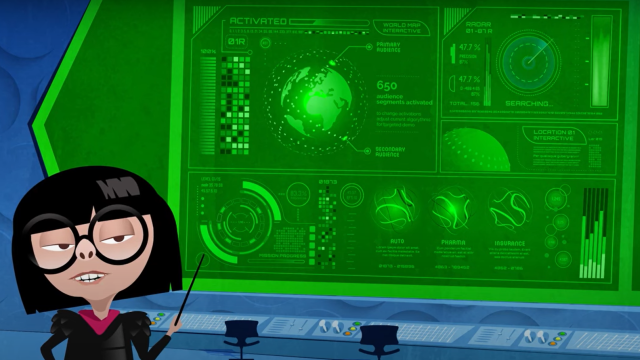If you’ve ever wondered how the Walt Disney Corporation is mining your data for targeted advertisements across platforms, today’s your lucky day. Baymax of Big Hero 6 and Edna Mode from The Incredibles are here to explain it all.
In leaked videos first obtained and reported on by Vice, Disney characters have been extracted from their original contexts and inserted into the company’s ad sales training and marketing materials. There, in a nightmare scenario, the facsimiles of your beloved childhood memories are re-animated and re-voiced to tell you all about Disney’s innovative advertising technologies.
“It starts with over 900 audience segments informed by behaviours, purchases, store visits, and fandom — all customised for your business. They’re powered at the core by our unmatched Disney first party data: From content consumption to self-reported data, and our own quarterly survey of fans,” says a simplified rendering of Edna Mode, fashion and “supersuit” designer from The Incredibles franchise.
One video begins with almost a full minute of narrative set-up that mirrors Mode’s character introduction in the first Incredibles movie. A car approaches the gate of a heavily secured facility, Mode pushes a security guard out of the way on an intercom screen. There’s a bit with a laser weapon. The cartoon introduces herself as “stylist to the gods.”
Except something is off — the animation of the mouth is choppy and poorly aligned with the voice acting, which itself occupies an uncanny gulf between my memory of the actual Incredibles movie and a shoddily made YouTube dub. And then, of course, she’s discussing ad tech.
Edna explains “Luminate,” or “Disney’s powerful suite of advanced advertising products — all fuelled by a proprietary data library that leads the market in both scope and quality. Across the market we reach 280 million fans each month. While others say they are digital first, we at Disney are bold, dramatic, heroic,” as the character explains it.
The cartoon vaguely assures viewers that, all the while, the company is “exceeding the highest standards of privacy and data security.” Whose standards? Who knows. The company’s public data security policy states that, “we have implemented technical, administrative, and physical security measures that are designed to protect guest information from unauthorised access, disclosure, use, and modification. We regularly review our security procedures to consider appropriate new technology and methods. Please be aware that, despite our best efforts, no security measures are perfect or impenetrable.” Disney did not immediately respond to Gizmodo’s request for comment.
The Big Hero 6-themed video dives deeper into advertising strategy on some of the platforms Disney owns (note: Disney owns a lot, including Hulu). “We’re leaning into Hulu’s viewer first ad formats and marrying those with Disney’s long history of connecting with our fans. Way before anyone else, Hulu mined the data on how viewers watch, and then pioneered non-disruptive ad formats with pause and binge ads that respond to viewer behaviours,” says Baymax in the character’s signature, uninflected voice. “As you can see, it works. We see a 68% lift in ad recall.”
Discussing the “shorter and skippable” ads shown on Disney-owned ESPN+, the hollowed-out husk of Baymax further explains that the format “encouraged increased audience consumption and engagement with ads, while delivering on your brand KPIs [Key Performance Indicators].”
The cartoon robot goes on to introduce a new strategy meant to boost online purchases: “These days, we’re all shopping from home more than ever. To take advantage of this consumer trend, Disney has invested in a direct e-commerce strategy that provides access to several new ad products, all designed to accelerate the purchase.”
Another video in the same genre of corporate horror includes the Muppets characters Bunsen and Beaker. Previously, Disney also released a Star Wars-themed video that mentioned credit card and “survey-based pharma data,” according to Vice.
Disney isn’t new to the ad game. The company has a detailed online explainer outlining its online tracking and advertising practices, as well as policies for how the company collects and incorporates in-person activity from things like theme park visits and store purchases. And Disney is by no means the first company to track as much as it can about people in order to make more money off of them. That’s the basis of all advertising technology, and basically all companies are ad companies now — trading in user/consumer data.
But the happiest place on Earth gets just a little bit bleaker when beloved characters are transparently co-opted to discuss data mining.
